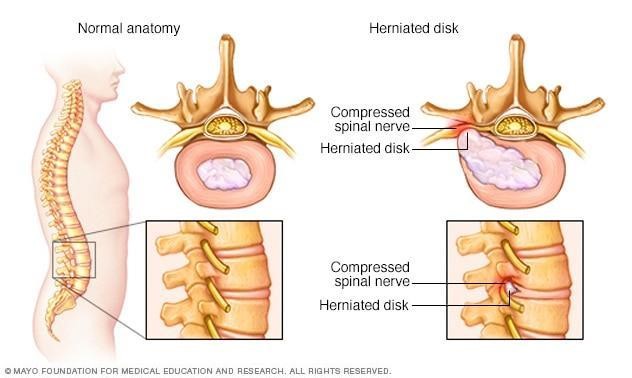Lumbar disc herniations are a common source of low back and leg pain in adults. As we age, we tend to accept low back pain as a part of getting old — and that we should expect it. The truth is no one should live with pain!
Physical Therapy for Lumbar Disc Herniation
Enduring pain is abnormal and unnecessary, and there is evidence to support that lower back pain therapist can address low back pain from a herniated, slipped, or ruptured disc. Here is how the professionals at Uncommon Physical Therapy can help.
Disc Herniation as a Source of Back Pain
The spine comprises vertebrae stacked one on top of the other, starting at the base of the head and extending down to what most people know as the “tailbone.” The spine has different sections based on where they are in the body. The lumbar spine is the section that makes up the lower back area, just above the hips. Between each vertebra is a disc of cartilage. This cartilage can become overloaded such that the outer cartilage tears and a piece of the inner cartilage “slip out;” this now protruding piece of the disc can create compression on the nerves that exit the spine from the spinal cord.
Symptoms of a Herniated Disc
The compression of the herniated disc on the nervous structures that exit the spine can lead to a variety of symptoms:
- Low back pain
- Pain in the buttocks or down the legs
- Pain with sitting with relief upon standing
- Numbness or tingling in the legs or feet
- Weakness in legs
Physical Therapy for a Herniated Disc
Low back pain is so prevalent globally that a plethora of evidence-based research supports physical therapy for conservative management of back pain associated with lumbar disc herniation. Here at Uncommon Physical Therapy, we use the most up-to-date research to help guide our treatment plans, emphasizing manual physical therapy.
We offer a variety of hands-on therapies such as dry needling, therapeutic ultrasound, cupping, soft tissue manipulation, and joint mobilization. We use these treatments in combination with a personalized exercise plan to help target your deficits and address the impairments that commonly accompany disc herniation.
When patients come into Uncommon Physical Therapy, we take the time to listen to everyone. We want to hear about your history, measure your strength and flexibility, see how well you can move, and know your goals.
During your first visit to Uncommon PT, we conduct a thorough examination — we discuss your symptoms, look at your strength and range of motion, and identify what provokes your pain. Then we can focus on your most significant deficits while considering your goals for physical therapy, so we can help get you back to the lifestyle you deserve. Pain should not have to become your new reality.
With our team here at Uncommon Physical Therapy, we can help you address your pain so that you can get back to living.
Call (704) 803-8038 or join us on Facebook We look forward to helping you!






